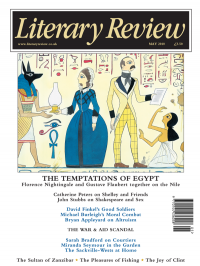Christopher Coker
Force For The Good
Moral Combat: A History of World War II
By Michael Burleigh
HarperPress 650pp £30
As one of the first American journalists to arrive in Berlin after the end of the Second World War, John Dos Passos was embarrassed by the devastation the American B29s had inflicted. At Stettiner Station he saw large crowds of bewildered people, their skin hanging on their bones ‘like candle drippings’. Berlin, he recalled, was not ‘just one more beaten-up city: there the point had been reached where the victims were degraded beneath the reach of human sympathy’. When Malcolm Muggeridge arrived in the same city, he was astonished by what he found. By then the Russians had fought their way into the streets, house by house. The friezes and columns had been torn away from the Brandenburg Gate, from which the most warlike nation in Europe had once dispatched its armies in triumph. The trees along Unter Den Linden had been cut down for firewood or charcoal. The subway had been flooded on the order of Hitler himself, leaving people floating in black icy waters. The city presented a barren landscape permeated by the sour smell of rotting corpses and the occasional glimpse of the 50,000 or so orphans who’d been made deranged by both the bombing and the ferocity of the final ground attack. Did all this, Muggeridge asked, represent the triumph of good over evil?
The world both writers saw was born from some of the moral compromises the Western allies had to make to win the war. That Hitler had to be defeated and Nazism crushed was the one moral certainty that sustained them. Churchill, Michael Burleigh reminds us in this magisterial

Sign Up to our newsletter
Receive free articles, highlights from the archive, news, details of prizes, and much more.@Lit_Review
Follow Literary Review on Twitter
Twitter Feed
The son of a notorious con man, John le Carré turned deception into an art form. Does his archive unmask the author or merely prove how well he learned to disappear?
John Phipps explores.
John Phipps - Approach & Seduction
John Phipps: Approach & Seduction - John le Carré: Tradecraft; Tradecraft: Writers on John le Carré by Federico Varese (ed)
literaryreview.co.uk
Few writers have been so eagerly mythologised as Katherine Mansfield. The short, brilliant life, the doomed love affairs, the sickly genius have together blurred the woman behind the work.
Sophie Oliver looks to Mansfield's stories for answers.
Sophie Oliver - Restless Soul
Sophie Oliver: Restless Soul - Katherine Mansfield: A Hidden Life by Gerri Kimber
literaryreview.co.uk
Literary Review is seeking an editorial intern.